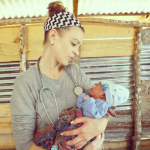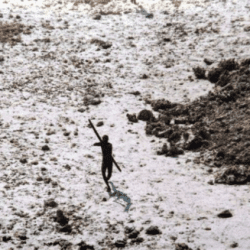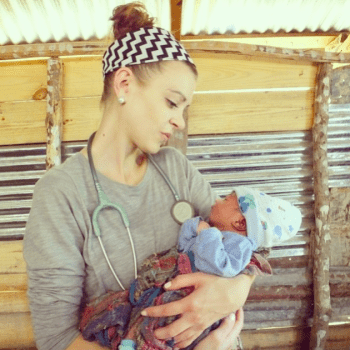When I first started doing public speaking engagements, a philosophy professor contacted me and asked if I’d like to come speak to his Theodicy class.
I said, “Sure,” and then as soon as we got off the phone I Googled “Theodicy” because I had no idea what it was.
I learned that Theodicy is the study of why bad things happen in the world if the world is controlled by a loving God.
I’ve definitely asked that question. A lot, actually. Why did I get breast cancer when I was 27 years old? Why did the Somali girls’ three brothers die in Somalia before they could get out? Why do six million kids under age 5 die every year in the developing world?
We like to ask that question, don’t we? Why does a loving God allow so much suffering?
We like to speculate. We like to do mental and theological gymnastics to get our theology to fit with the world we experience. Philosophers have filled books with theories. Universities have courses that explore this difficult-to-answer question.
I thought a lot about it until I went to Togo and began practicing medicine at a hospital in rural West Africa that had no air conditioning, no ventilators, no mosquito nets and, sometimes, no water.
I handed dead babies back to their parents because they’d brought them to the hospital too late for us to save or because the children were simply too sick to survive.
I watched a wife weep over the body of her husband, a 55-year-old man with severe respiratory distress who kept looking at me with pleading eyes saying, “Madam — I — can’t — breathe — ” And I kept telling him, “I know. We’re trying as hard as we can.” And then his body gave out and he lapsed into a coma and died.
I watched skeletal, starving babies admitted to pediatrics lie weak and motionless in their cribs as flies crawled over them. Their mothers swatted the flies and mosquitoes away with strips of fabric that all too often became shrouds when the babies’ souls left this world.
I lost more patients in one week in Togo than I’d lost in 10 years of medicine in the U.S. And yet, in spite of how much suffering I witnessed there, the question I came back to was never, “Why does God allow this suffering to happen?” Instead, I kept asking, “Why do we?”
We go on all-you-can eat cruises, get mani-pedi’s, waste food, spend hundreds of dollars a month on cable TV and other forms of entertainment, buy 10,000-square-foot houses, drive SUV’s that cost a fortune and get 10 miles a gallon, buy $100 jeans and designer sneakers, drink expensive espresso drinks every morning and….
It’s not that any one of these expenses is wrong per say. It’s that all together, the picture of life in the U.S. is that we are wealthier than the overwhelming majority of the world. We have more expendable income than we realize. And we use our resources on amusement and entertainment rather than being generous and sacrificial and making a tangible difference in the world.
We literally amuse ourselves to death while
- Six million children die in the developing world each year of preventable, or easily treatable, causes.
- Nearly a billion people live in extreme global poverty — living on less than $1.90/day.
- In our country, one in six Americans faces hunger as 49 million people struggle to put food on the table.
- There are 123 suicides a day in our country, making it the tenth leading cause of death in the U.S.
- Rates of loneliness have doubled since 1980, with 40% of adults saying they feel lonely on a regular basis.
- Tens of thousands of Americans die each year from gun violence.
I could go on, but you get the idea.
Suffering continues not because God doesn’t do anything about it but because we don’t.
And this isn’t meant to make anyone feel guilty. Instead, I think it should give us incredible hope! Because solutions to problems that have plagued our world for far too long are absolutely within our reach.
Rates of child mortality and extreme global poverty have dropped by 50% since 1990 because people have gotten involved and loved the world enough to do something about it. We’re on track to end child mortality and extreme global poverty by 2030 — if we make the effort. If we give, if we work, if we sacrifice, if we act as though the wellbeing of our fellow human beings depends on us (because it so often does!)
So let’s stop sitting around, wasting time asking why God allows suffering to happen in the world and let’s ask ourselves, “Why do we?”
And then let’s roll up our sleeves and care enough to do something about it.
***
If you’d like to make a tangible difference in the world, here are a few opportunities.
Sponsor a child with Compassion International to provide a child in the developing world with food, medicine, clean water and mentoring.
Make a contribution to The Invisible Girls’ Trust Fund to help send five Somali refugee sisters to college.
Donate to St. Gregory’s Food Pantry.
Partner with Heifer International to provide families and communities in the developing world with a sustainable food supply.
Make a micro-loan with Kiva so an entrepreneur in the developing world can get a small business off the ground.












